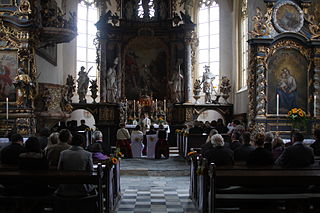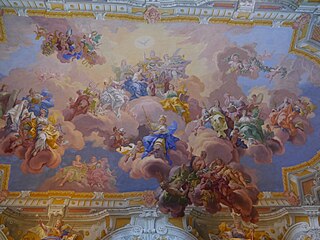
Libera me, WAB 22, is the second of two settings of the absoute Libera me, composed by Anton Bruckner in 1854.

The two Totenlieder, WAB 47/1 & 47/2, are elegies composed by Anton Bruckner in 1852.

Am Grabe, WAB 2, is an elegy composed by Anton Bruckner in 1861, for men's voices a capella.

Trauungschor, WAB 49, is a wedding song composed by Anton Bruckner on 8 January 1865.

The Mayer Cantata, WAB 60, is a cantata composed by Anton Bruckner in 1855. It is the second of three larger-scale occasional compositions, and the composer's first extended composition for large wind ensemble and choir.

The Arneth Cantata, WAB 61, is a cantata composed by Anton Bruckner in 1852.

Laßt Jubeltöne laut erklingen, WAB 76, is a festive song composed by Anton Bruckner in 1854.

The Volkslied, WAB 94, is a patriotic song composed by Anton Bruckner in 1882 for a competition for a Hymne für das Deutsche Volk in Österreich.

"Ständchen" ("Serenade"), WAB 84.2, is a Lied composed by Anton Bruckner in c. 1846.

Der Abendhimmel, WAB 55, is a song composed by Anton Bruckner in 1862.

Herbstlied, WAB 73, is a romantic song composed by Anton Bruckner in 1864. The song, scored for men's choir and two soprano soloists with piano accompaniment, depicts an autumn walking with nightingale song.

Sternschnuppen, WAB 73, is a song, which Anton Bruckner composed for his own men's voice quartet in c. 1848 during his stay in the Sankt Florian.

"An dem Feste", WAB 59a, is a song composed by the 19-year-old Anton Bruckner in 1843 during his stay as schoolteacher's assistant in Kronstorf. In 1893, near the end of his life, Bruckner modified slightly its music score and let Karl Ptak put another text on the song, with as title "Tafellied", WAB 59c.

Das Lied vom deutschen Vaterland, WAB 78, is a patriotic song composed by Anton Bruckner in c. 1845 during his stay in St. Florian.

Der Lehrerstand, WAB 77, is a song composed by Anton Bruckner in c. 1847 during his stay in Sankt Florian.

Das edle Herz, WAB 65, is a song composed by Anton Bruckner in c. 1851 during his stay in St. Florian.

Die Geburt, WAB 69, is a song composed by Anton Bruckner in 1851 during his stay in St. Florian.

Das edle Herz, WAB 66, is a song composed by Anton Bruckner in December 1857 during his stay in Linz. During his stay in St. Florian, Bruckner had already composed a first setting of the song for men's choir, WAB 65.

















